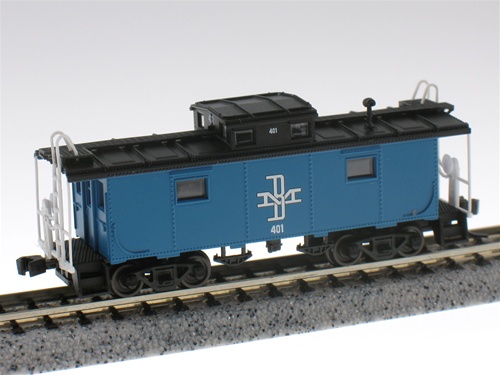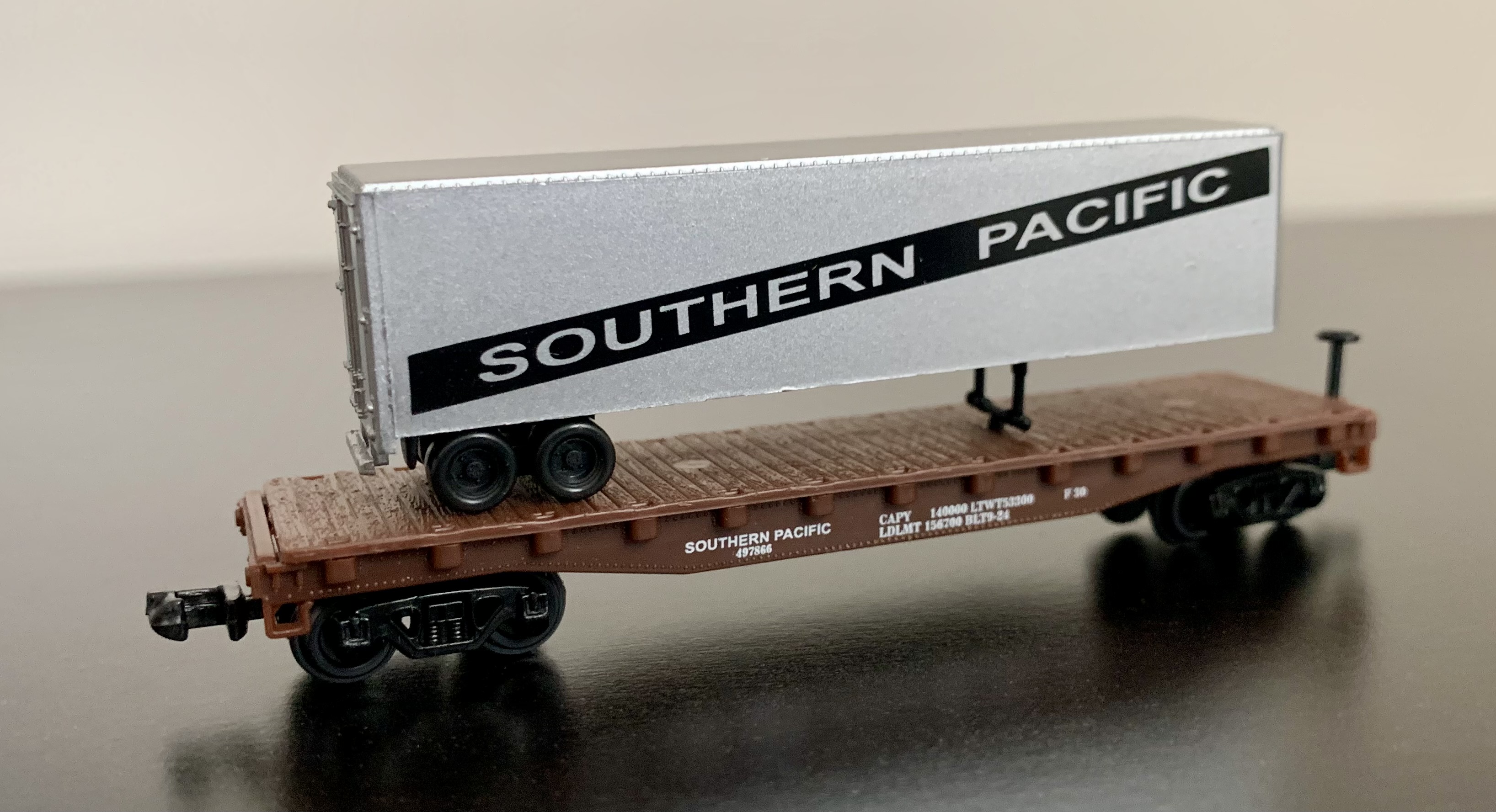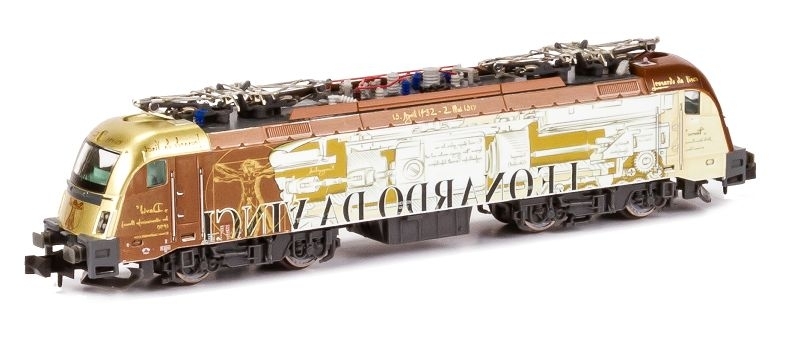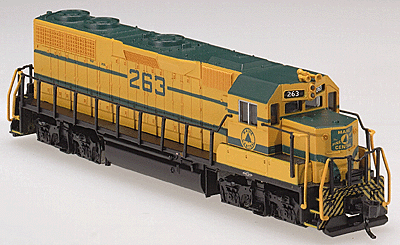Model Information: (Special Note: some of the pictures from Atlas appear to be of one of their larger-scale models - HO or O). This caboose model was introduced in 2004 and was a major step forward in quality from the earlier caboose models. Because of the initial product numbering convention, these models are known as "33" series. They show a higher level of detailing than earlier caboose body styles as can bee seen in the roofwalk, ladders and underframe. They also feature body-mount couplers.
At first glance these models seem very similar to the "39" series C&O cabooses from Atlas. The cupola may be found in the center of the body, and they feature two windows on each side supplemented by two separated windows on each side of the cupola. To distinguish the NE-6 from the "39" series C&O cabooses, you can see that the NE-6's are shorter and the NE-6 cupola has three panels on the cupola roof. Furthermore the cupola on the NE-6 is more squat than the one on the C&O.
The models feature: Finely detailed end rails, smokestack and ladders Brake line detail; Weighted chassis; Friction-bearing or roller-bearing caboose trucks as appropriate; Factory-equipped with AccuMate couplers; Accurate painting and printing; Railroad specific features
They are based on a standard caboose design of the International Car Company of Kenton, Ohio that was used in the 1940s. They are typically associated with the New Haven Railroad but this body style was in fact used by other rail lines as well. The cabooses showed real longevity and were found in operation well into the diesel era.
Two different body styles are available. The New Haven Body Style has windows spaced closer to the cupola, while the Nickel Plate Body Style has windows spaced further from the cupola.
At first glance these models seem very similar to the "39" series C&O cabooses from Atlas. The cupola may be found in the center of the body, and they feature two windows on each side supplemented by two separated windows on each side of the cupola. To distinguish the NE-6 from the "39" series C&O cabooses, you can see that the NE-6's are shorter and the NE-6 cupola has three panels on the cupola roof. Furthermore the cupola on the NE-6 is more squat than the one on the C&O.
The models feature: Finely detailed end rails, smokestack and ladders Brake line detail; Weighted chassis; Friction-bearing or roller-bearing caboose trucks as appropriate; Factory-equipped with AccuMate couplers; Accurate painting and printing; Railroad specific features
They are based on a standard caboose design of the International Car Company of Kenton, Ohio that was used in the 1940s. They are typically associated with the New Haven Railroad but this body style was in fact used by other rail lines as well. The cabooses showed real longevity and were found in operation well into the diesel era.
Two different body styles are available. The New Haven Body Style has windows spaced closer to the cupola, while the Nickel Plate Body Style has windows spaced further from the cupola.
Road Name History: 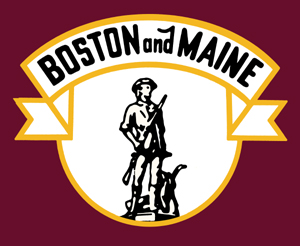 The Andover and Wilmington Railroad was incorporated March 15, 1833, to build a branch from the Boston and Lowell Railroad at Wilmington, Massachusetts, north to Andover, Massachusetts. The line opened to Andover on August 8, 1836. The name was changed to the Andover and Haverhill Railroad on April 18, 1837, reflecting plans to build further to Haverhill, Massachusetts (opened later that year), and yet further to Portland, Maine, with the renaming to the Boston and Portland Railroad on April 3, 1839, opening to the New Hampshire state line in 1840.
The Andover and Wilmington Railroad was incorporated March 15, 1833, to build a branch from the Boston and Lowell Railroad at Wilmington, Massachusetts, north to Andover, Massachusetts. The line opened to Andover on August 8, 1836. The name was changed to the Andover and Haverhill Railroad on April 18, 1837, reflecting plans to build further to Haverhill, Massachusetts (opened later that year), and yet further to Portland, Maine, with the renaming to the Boston and Portland Railroad on April 3, 1839, opening to the New Hampshire state line in 1840.
The Boston and Maine Railroad was chartered in New Hampshire on June 27, 1835, and the Maine, New Hampshire and Massachusetts Railroad was incorporated March 12, 1839, in Maine, both companies continuing the proposed line to South Berwick, Maine. The railroad opened in 1840 to Exeter, New Hampshire, and on January 1, 1842, the two companies merged with the Boston and Portland to form a new Boston and Maine Railroad.
The B&M flourished with the growth of New England's mill towns in the late 19th and early 20th centuries, but still faced financial struggles. It came under the control of J. P. Morgan and his New York, New Haven and Hartford Railroad around 1910, but anti-trust forces wrested control back. Later it faced heavy debt problems from track construction and from the cost of acquiring the Fitchburg Railroad, causing a reorganization in 1919.
By 1980, though still a sick company, the B&M started turning around thanks to aggressive marketing and its purchase of a cluster of branch lines in Connecticut. The addition of coal traffic and piggyback service also helped. In 1983 the B&M emerged from bankruptcy when it was purchased by Timothy Mellon's Guilford Transportation Industries for $24 million. This was the beginning of the end of the Boston & Maine corporate image, and the start of major changes, such as the labor issues which caused the strikes of 1986 and 1987, and drastic cost cutting such as the 1990 closure of B&M's Mechanicville, New York, site, the largest rail yard and shop facilities on the B&M system.
Guilford Rail System changed its name to Pan Am Railways in 2006. Technically, Boston & Maine Corporation still exists today but only as a non-operating ward of PAR. Boston & Maine owns the property (and also employs its own railroad police), while Springfield Terminal Railway, a B&M subsidiary, operates the trains and performs maintenance. This complicated operation is mainly due to more favorable labor agreements under Springfield Terminal's rules.
Read more on Wikipedia.

The Boston and Maine Railroad was chartered in New Hampshire on June 27, 1835, and the Maine, New Hampshire and Massachusetts Railroad was incorporated March 12, 1839, in Maine, both companies continuing the proposed line to South Berwick, Maine. The railroad opened in 1840 to Exeter, New Hampshire, and on January 1, 1842, the two companies merged with the Boston and Portland to form a new Boston and Maine Railroad.
The B&M flourished with the growth of New England's mill towns in the late 19th and early 20th centuries, but still faced financial struggles. It came under the control of J. P. Morgan and his New York, New Haven and Hartford Railroad around 1910, but anti-trust forces wrested control back. Later it faced heavy debt problems from track construction and from the cost of acquiring the Fitchburg Railroad, causing a reorganization in 1919.
By 1980, though still a sick company, the B&M started turning around thanks to aggressive marketing and its purchase of a cluster of branch lines in Connecticut. The addition of coal traffic and piggyback service also helped. In 1983 the B&M emerged from bankruptcy when it was purchased by Timothy Mellon's Guilford Transportation Industries for $24 million. This was the beginning of the end of the Boston & Maine corporate image, and the start of major changes, such as the labor issues which caused the strikes of 1986 and 1987, and drastic cost cutting such as the 1990 closure of B&M's Mechanicville, New York, site, the largest rail yard and shop facilities on the B&M system.
Guilford Rail System changed its name to Pan Am Railways in 2006. Technically, Boston & Maine Corporation still exists today but only as a non-operating ward of PAR. Boston & Maine owns the property (and also employs its own railroad police), while Springfield Terminal Railway, a B&M subsidiary, operates the trains and performs maintenance. This complicated operation is mainly due to more favorable labor agreements under Springfield Terminal's rules.
Read more on Wikipedia.
Brand/Importer Information: Bluford Shops began in 2007 as a side project of two model railroad industry veterans, Craig Ross and Steve Rodgers. They saw a gap between road names available on N scale locomotives but not available on cabooses. They commissioned special runs of Atlas cabooses in Atlantic Coast Line, Central of Georgia, Monon, Boston & Maine and Southern plus runs on Grand Trunk Western and Central Vermont on the MDC wooden cabooses. While these were in process, they began to develop their first all new tooling project, 86' Auto Parts Boxcars in double door and quad door editions in N scale. By January of 2008, Bluford Shops became a full time venture. Along with additional N scale freight cars and their own tooling for new cabooses, they have brought their own caboose line to HO scale. They also have their popular Cornfields in both HO and N. The future looks bright as they continue to develop new products for your railroad.
The town of Bluford in southern Illinois featured a small yard on Illinois Central's Edgewood Cutoff (currently part of CN.) The yard included a roundhouse, concrete coaling tower (which still stands) and large ice house. Reefer trains running between the Gulf Coast and Chicago were re-iced in Bluford. Things are more quiet now in Bluford with the remaining tracks in the yard used to stage hoppers for mines to the south and store covered hoppers. Intersecting the IC line in Bluford is Southern Railway's (currently NS) line between Louisville and St. Louis. Traffic on this single track line remains relatively heavy.
The town of Bluford in southern Illinois featured a small yard on Illinois Central's Edgewood Cutoff (currently part of CN.) The yard included a roundhouse, concrete coaling tower (which still stands) and large ice house. Reefer trains running between the Gulf Coast and Chicago were re-iced in Bluford. Things are more quiet now in Bluford with the remaining tracks in the yard used to stage hoppers for mines to the south and store covered hoppers. Intersecting the IC line in Bluford is Southern Railway's (currently NS) line between Louisville and St. Louis. Traffic on this single track line remains relatively heavy.
Item created by: gdm on 2016-03-08 18:17:00. Last edited by Alain LM on 2021-03-07 09:20:44
If you see errors or missing data in this entry, please feel free to log in and edit it. Anyone with a Gmail account can log in instantly.
If you see errors or missing data in this entry, please feel free to log in and edit it. Anyone with a Gmail account can log in instantly.


